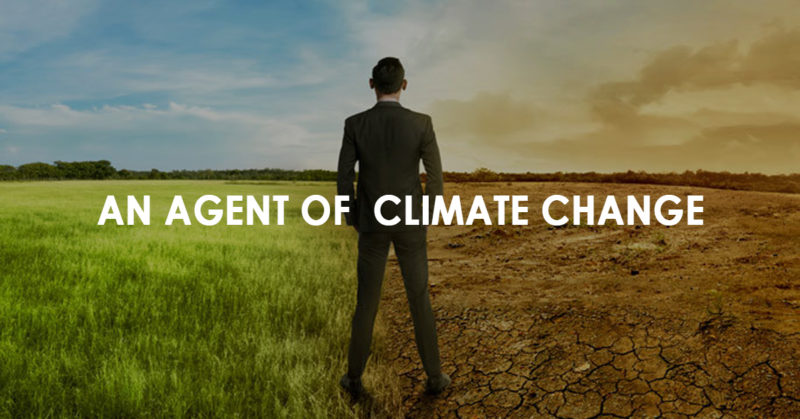
The role of every individual in being an agent for protecting the environment has become all the more important. It is also a fact that public responsibility for climate change is crucial to address the gravity of the crisis. At the same time, let us not forget that the Earth is our home, our only home which needs to be protected not only for us but also for generations to come. One small step to ‘CHANGE’ today; can ‘CHANGE’ the ‘destiny’ of humanity forever.
AN AGENT OF CLIMATE CHANGE
“The greatest threat to our planet is the belief that someone else will save it.” ~ Robert swan
As a high school student, I remember making an investment by planting a beautiful young tree on 5th of June, that is the world environment day. The investment was made hoping that one day it will give a cool shade on a hot day, beautiful flowers in the spring, grow into a large tree and most importantly make a positive difference tomorrow. Although we live in an age of pollution, climate change and global warming, the young tree which was once planted as a sapling survived According to the American Forestry Association (1992), a single tree provides 73$ worth of air conditioning, 75$ worth of erosion control, 75$ worth of wildlife shelter and 50$ worth of air pollution control. This is the benefit or returns from planting a single tree.
On September 23, 2019, world meteorological organization stated that the global average temperature has increased by 1.1 degree celsius, with carbon dioxide growing at a rate of nearly 20% higher than the previous five years, the global sea level rising by 5mm per year from may 2014-2019, with more than 90% of the natural disaster being related to weather. All these information are a reminder that our today is threatened and the same goes for our tomorrow. If we do not take an initiative and tend to neglect the fact, we are headed for doomsday. Research has projected that by the mid-century t (2020-2050), there will be an increase in annual average temperature between 1.6-1.8 degree celsius.
Nagaland State in spite of no major industries that produce huge amounts of waste dumped freely or disposed of in nature. Nagaland and other states contribute to and experience climate change with the main reason mainly because of heavy deforestation and dumping of huge waste without proper waste treatment. To be precise 342 tons of waste is produced per day in urban areas in Nagaland, with Kohima being the only place that produces 50 tonnes of waste per day having efficient treatment of waste as stated by the Nagaland integrated waste policy 2019. The northeast area has witnessed a decline in its forest area 3,199 sq km since 2009 as per the India state of forest report ISFR released by the eEnvironment Minister Prakash Javadekar on December 30, 2019. This decline in the forest area in Northeast India took place even as the overall forest and tree cover marked an increase on the national level. The question of retrieving the lost resources due to human activities seems to be an awakening call for the people residing in the northeastern parts.
We are very serious when it comes to protecting our culture, whether it be our festivals, language, the dresses that we wear, the dishes that we eat How about translating these practices to protecting our natural environment, given the fact that we all share the common mother earth. Are we doing our bit to protect the environment and slowing the pace or reversing of climate change?
The role of every individual in being an agent for protecting the environment has become all the more important. Every effort should be made given the fact that climate change and other natural calamities are happening for real. As individuals, we can take initiative to plant a single tree, reduce, reuse and recycle waste to reduce pollution, proper waste treatment, sustainable use of scarce resources to shape and protect our tomorrow. Students have a particular responsibility to protect the environment even as we dream of a better future. If not the earth that you call home, where will you find a better planet, that best explains the meaning of giving life.
Degree of Thought is a weekly community column initiated by Tetso College in partnership with The Morung Express. Degree of Thought will delve into the social, cultural, political and educational issues around us. The views expressed here do not reflect the opinion of the institution. Tetso College is a NAAC Accredited UGC recognised Commerce and Arts College. The editors are Dr Hewasa Lorin, Dr. Aniruddha Babar, Dr. Pfokrelo Kapesa, Rinsit B Sareo, Meren Lemtur and Kvulo Lorin.
For feedback or comments please email: dot@tetsocollege.org

